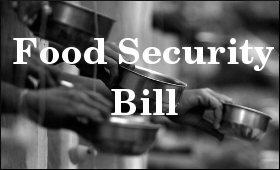|

|
'Food security bill push up fiscal deficit to 5 pc of GDP'
|
|

|
|
| Top Stories |
 |
|
|
|
SME Times News Bureau | 22 Jul, 2013
Implementing the food security bill will bring additional fiscal pressure and push up the fiscal deficit to five percent of GDP in the current financial year, said industry chamber FICCI here Sunday.
"It will impose an additional pressure on the fiscal situation and would make fiscal sustainability plan of the country difficult to achieve. As a result, the expected fiscal deficit to GDP ratio is five percent for 2013-14, which is slightly above the budgeted 4.8 percent," said the Federation of Indian Chambers of Commerce and Industry's Economic Outlook Survey.
The survey respondents felt that allocating food through the public distribution system is plagued with inefficiencies and ensuring efficiency in the delivery system is required.
Earlier this month, the government promulgated an ordinance to implement the Food Security Bill, giving over two-thirds of the population the right to 5 kg of foodgrains each month at the subsidised rates of one to three rupees per kg.
Government spending on the programme is estimated at Rs.1,25,000 crore annually for supplying about 62 million tonnes of rice, wheat and coarse cereals to 67 percent of the population.
The economists participating in the survey expect the country's GDP to grow by around six percent during the current fiscal.
"Some grave concerns remain and these would have to be handled promptly to get economy back on growth trajectory," the report said.
It further said decline in industrial output, widening current account deficit and a depreciating rupee may dampen the growth prospects the country if adequate supportive action is not taken.
The survey also said GDP will grow by five percent during the first quarter of the fiscal.
FICCI said the depreciating rupee will impact the widening current account deficit (CAD) that results when total imports of goods, services and transfers is greater than the exports.
For the first quarter of the current financial year, CAD to GDP ratio is projected at five percent and it may temper in the second half of the fiscal.
"Financing CAD will be the real challenge this year as global liquidity will be under pressure," it said.
The CAD hit a record high of 4.8 percent in the 2012-13 fiscal.
The survey further asked the Reserve Bank of India to cut key policy rates to boost the economic growth.
"A majority of the participating economists anticipated a 50-75 basis points cut in repo rate by end of this fiscal year," it said.
|
|
|
| |
|
|
|
|
|
|
|
|
|
|
|
|
|
|
| |
| Customs Exchange Rates |
| Currency |
Import |
Export |
US Dollar
|
₹88.70
|
₹87 |
UK Pound
|
₹119.90
|
₹116 |
Euro
|
₹104.25
|
₹100.65 |
| Japanese
Yen |
₹59.20 |
₹57.30 |
| As on 30 Oct, 2025 |
|
|
| Daily Poll |
 |
 |
| Who do you think will benefit more from the India - UK FTA in the long run?
|
|
|
|
|
|
| Commented Stories |
 |
|
|
|
|
|
| |
|